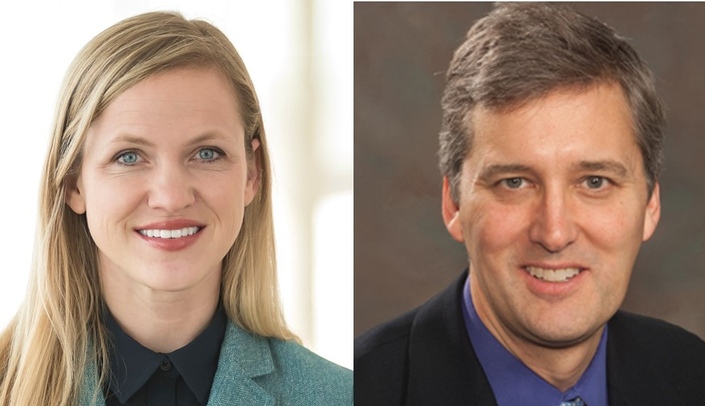Witnessing the Global Center for Health Security and federal partners’ response to the COVID-19 pandemic, Director of Ethics and Public Health Preparedness Abbey Lowe observed ethics-related questions, centered on quarantined individuals, rising from the daily operations meeting’s discussions. Those unprecedented ethical issues needed quick responses. Dr. David Brett-Major, an internal medicine and infectious diseases physician assisting GCHS with the COVID-19 response, encouraged Ms. Lowe to submit a proposal to the GCHS leadership team detailing the challenges and the proposed solution: Convene a national ethics advisory committee to support emerging ethical questions and provide guidance for time-sensitive issues. Once leadership agreed and approved the proposal, Ms. Lowe defined her criteria for a volunteer committee and began the search for members.
"We wanted diversity in term of backgrounds," Ms. Lowe noted, so she assembled a committee with a depth of ethics expertise in the areas of public health, health care, disaster response, and preparedness, as well as clinical experts such as nurses, physicians, and legal experts. Dr. Matt Wynia, Director of the Center for Bioethics and Humanities at the University of Colorado, is chair of the ethics advisory committee (EAC). Dr. Wynia is a physician with specialty training in public health and infectious diseases. He has a long history of leadership in bioethics and professionalism and policy issues—with a focus on ethical issues in public health emergencies. As a past president of the American Society for Bioethics and Humanities, Dr. Wynia has the range of experience to help guide the committee. Dr. Wynia explained, "The committee has brought together an outstanding group of ethicists to compare diverse local experiences, tackle real-world issues, and create ethical frameworks for people requesting urgent guidance on real-world issues."
Most recently, the National Institute of Environmental Health and Science (NIEHS) awarded the committee funding to collaborate with their worker training program. The NIEHS program funds training for workers in a variety of hazardous occupations such a first responders, health care workers, construction workers, and law enforcement. The committee organized a summer webinar series around COVID-19, Ethics, and the Workplace. The series took on infection prevention and control, worker safety, industrial hygiene and ethical contact tracing, all with the workplace in mind. The committee continues to work with NIEHS to produce and distribute modules for the NIEHS worker training program on ethical issues in the workplace during the pandemic, while also providing ethical guidance upon request.
Meeting weekly since March 2020, the EAC has provided ethics guidance to the University of Nebraska Medical Center, Nebraska Medicine, federal and state partners, and other stakeholder groups. GCHS Executive Director of Emergency Management and Clinical Operations Shelly Schwedhelm reports, "The EAC has been an invaluable resource in navigating complex clinical and public health issues associated with the pandemic." Requests for assistance can be easily submitted on the GCHS website. If a request needs immediate review, it can be marked as urgent to receive priority attention—real-time problems during a global crisis demand real-time solutions. Time-sensitive requests are handled with a rapid review process by gathering several members (rather than the entire committee) to provide prompt guidance and feedback.
Standard requests often require investigation and research to get to the core of the issue; thus, they take longer to complete. People requesting assistance with an ethical issue often do so because they want to ensure they are ‘doing right’ by the people in their community. GCHS Executive Director of International Programs and Innovation Dr. James Lawler stated, "The committee has helped identify the values at stake in key issues allowing our teams to make better decisions." The EAC investigates the risks, burdens, and benefits of an issue and then holds an in-depth discussion. After reaching a consensus, a report is created detailing the recommended ethical guidance. Some of those reports can be accessed by the public in the consultation reports section of the GCHS website.
While the road to COVID-19 recovery seems to stretch long before us, Abbey Lowe believes post COVID-19 there will still be a need for real-time ethics guidance for GCHS response teams. "There is a need to support readiness and response for a team equipped to move quickly. Real-time ethics feedback ensures the very human issues associated with health security receive due attention," Ms. Lowe said. As GCHS supports the contours of the pandemic, the guidance of the EAC will continue to be supportive of its future missions.
Ethics Advisory Committee members include:
